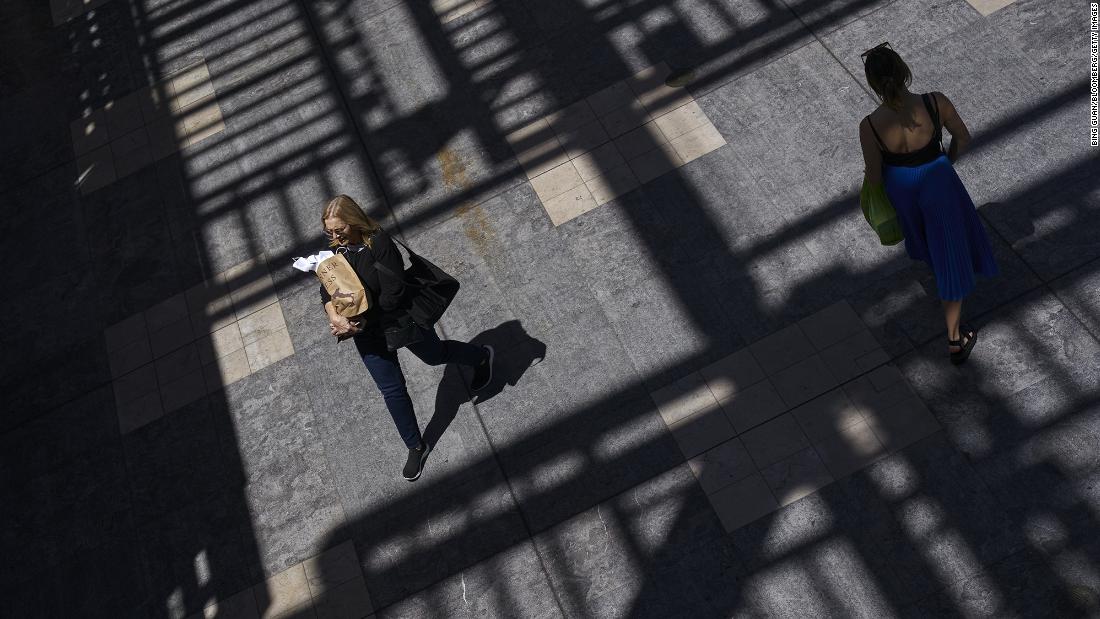USA: uncertainty in the financial market due to possible recession 0:52
New York (CNN Business) --
Deutsche Bank caused a stir earlier this month by becoming the first major bank to forecast a recession in the United States, though it characterized it as "mild" at the time.
Now the bank is warning of a deeper slowdown caused by the Federal Reserve's quest to tackle stubbornly high inflation.
"We will have a major recession," Deutsche Bank economists wrote in a report to clients on Tuesday.
The problem, according to the bank, is that while inflation may be peaking, it will be "a long time" before it drops back down to the Fed's 2% target.
That suggests the central bank will raise interest rates so aggressively that it will hurt the economy.
"We believe that ... it is very likely that the Fed will need to hit the brakes more firmly, and that a deep recession will be needed to bring inflation at bay," Deutsche Bank economists wrote in their report with the ominous headline of "Why the next recession will be worse than expected".
The Dow plunges more than 600 points amid fears of a recession
behind the curve
Consumer prices soared 8.5% in March, the fastest pace in 40 years.
The labor market remains tight, and Moody's Analytics expects the unemployment rate to soon fall to the lowest level since the early 1950s.
advertising
To argue its case, Deutsche Bank created an index that tracks the distance between inflation and unemployment over the past 60 years and the Federal Reserve's stated targets for those metrics.
That research, according to the bank, concludes that the Fed is today "much further behind" than it has been since the early 1980s, a period in which soaring inflation forced the central bank to raise interest rates to record highs, crushing the economy.
History shows that the Fed "has never been able to correct" even small excesses in inflation and employment "without pushing the economy into a significant recession," Deutsche Bank said.
The Federal Reserve raises interest rates for the first time since 2018
Noting that the job market has "overadjusted" by as much as two percentage points of unemployment, the bank said "it will take something stronger than a mild recession to pull it off."
The good news is that Deutsche Bank sees the economy recovering by mid-2024, as the Fed reverses course in its fight against inflation.
Goldman Sachs: "recession is not inevitable"
Of course, no one knows exactly how this will all play out.
Although Deutsche Bank is bearish, it is the most bearish of the big Wall Street banks, others argue that this pessimism is exaggerated.
Goldman Sachs admits that it will be "very difficult" to reduce high inflation and wage growth, but stresses that a recession is "not inevitable".
"We don't need a recession, but we probably do need growth to slow to somewhat below potential, a path that raises recession risk," Goldman Sachs economists wrote in a report late Friday.
UBS is similarly hopeful that the economic expansion will continue despite the Fed's switch to inflation-fighting mode.
"Inflation should ease from current levels, and we don't expect a recession from rising interest rates," Mark Haefele, chief investment officer at UBS Global Wealth Management, wrote in a report Monday.
War and covid lockdowns drive inflation
Deutsche Bank said the biggest factor behind its more negative view is the likelihood that inflation will remain "persistently elevated for longer than is generally expected."
The bank said several developments will contribute to inflation being higher than feared, including: globalization reversal, climate change, more supply chain disruptions caused by the war in Ukraine and covid lockdowns. -19 in China and the next increases in inflation expectations that will support actual inflation.
"The plague of inflation is back and it's here to stay," Deutsche Bank said.
If inflation remains high, the Fed will be forced to consider more drastic interest rate hikes.
The Federal Reserve raised interest rates by a quarter of a percentage point in March and Chairman Jerome Powell admitted last week that a half-point hike is "on the table" at next week's meeting.
"It is very tempting to take a slow approach in the hope that the US economy can land softly on a sustainable path. This will not happen," Deutsche Bank said.
"Our view is that the only way to minimize the economic, financial and social damage of prolonged inflation is to err on the side of doing too much."
Recession

